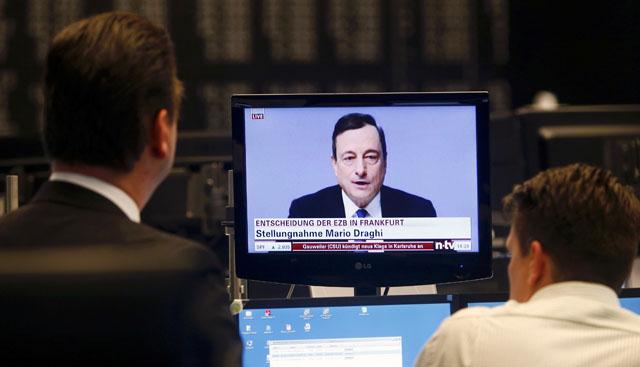You are here
ECB to reduce negative interest rates, even further
By AFP - Sep 10,2019 - Last updated at Sep 10,2019

This file photo taken on December 13, 2018, shows, the headquarters of the European Central Bank in Frankfurt am Main, western Germany (AFP photo)
FRANKFURT AM MAIN — The European Central Bank (ECB) is widely expected on Thursday to lower negative interest rates even further, and possibly bring back its multi-billion-euro quantitative easing programme.
Here are the monetary policy tools the Frankfurt institution has hinted at deploying in the coming months to battle the uncertainty — over trade tensions, Brexit, geopolitical clashes and emerging market woes — weighing on progress towards its price stability goal.
Interest rates
The ECB has sunk interest rates to historic lows since the twin shocks of the global financial and eurozone crises, as it pursues its mandated target of inflation of just below 2 per cent.
While deciding in July to hold the rate it charges on banks' deposits at the present -0.4 per cent, officials said it could dive to "lower levels".
Such a move should encourage lenders to issue more credit and invest in the real economy rather than hoarding cash.
Meanwhile, the ECB is less likely to shift its main refinancing rate — the interest it charges on one-week loans to banks — from its present zero per cent level.
'Tiering'
With an eye on complaints from banks that the negative rates were hurting their business model, ECB chief Mario Draghi promised six weeks ago that "if we are to lower interest rates, that will come with mitigating measures".
Among such action could be a "tiering" system to exempt some deposits from the harshest negative rate.
Sweden, Switzerland, Denmark and Japan have already adopted such a measure, slashing lenders' annual bill on excess liquidity, which for eurozone banks currently amounts to around 7.5 billion euros ($8.4 billion) — mostly paid by French and German lenders.
Cheap loans to banks
In March, Draghi said the bank would offer a third series of cheap two-year loans between September 2019 and March 2021.
The institution gave banks the chance to borrow massive amounts at extremely favourable interest rates in schemes known as TLTRO I and II between 2014 and 2016.
The measure was another attempt to encourage lending to the sluggish real economy.
Banks, especially the more fragile members of the sector in Italy, leapt at the chance for low-cost liquidity.
ECB policymakers decided in June that, depending on how much the banks lend to the real economy, they could — as in previous rounds — even enjoy a negative interest rate as low as -0.3 per cent on their borrowings.
That would mean the central bank effectively paying them to borrow money.
Mass bond-buying
When lower interest rates alone failed to restore growth and inflation, the ECB turned to a policy of mass purchases of government and corporate bonds, known as "quantitative easing" or QE.
Between March 2015 and December 2018, policymakers bought up 2.6 trillion euros of debt, mostly at a pace of tens of billions per month.
The aim: To flush newly-created money through the financial system and into the real economy to stimulate growth.
Central bankers credit the scheme with helping ward off deflation and create millions of jobs.
In July, the ECB signalled it could once again employ that tool, saying it has tasked officials to examine "options for the size and composition of potential new net asset purchases".
A possible relaunch of QE "remains the natural policy response in the absence of a sustained rebound in inflation expectations", Pictet Wealth Management Strategist Frederik Ducrozet said.
But a new round of bond-buying could require the ECB to relax a 33 per cent limit on the share of any one country's debt it can buy.
That, in turn, could bring new legal and political challenges down on its head, risking a repeat appearance before Germany's constitutional court over allegations of "monetary financing" — or the central bank directly footing the bill for state spending — which is banned under European treaties.
Related Articles
The European Central Bank (ECB) took the ultimate policy leap on Thursday, launching a government bond-buying programme which will pump hundreds of billions in new money into a sagging eurozone economy.
The European Central Bank (ECB) rolled out Thursday an unprecedented package of measures, including negative interest rates, in its fight to head off the spectre of deflation in the euro area.
FRANKFURT — European Central Bank (ECB) chief Mario Draghi unleashed a bold easing package on Thursday, cutting rates and expanding asset bu












